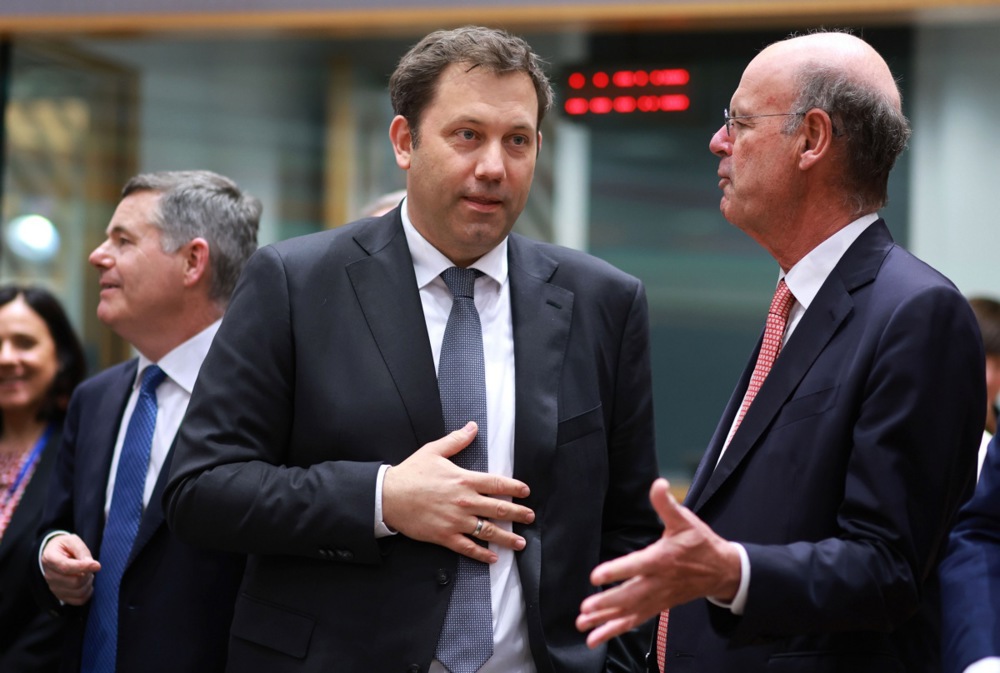BRUSSELS – Germany’s defence and infrastructure splurge could see it breach the EU’s fiscal threshold this year, Berlin’s new finance minister said on Monday.
Lars Klingbeil told reporters that it is too early to predict whether Germany’s next budget will see the EU’s largest economy surpass the bloc’s deficit ceiling of 3% of annual GDP in 2025.
“This is my fifth day in office,” the socialist politician said when directly asked whether Berlin would contravene the 3% limit.
“We are getting ready to set up the budget for [2025] now,” Klingbeil added. “All these questions will also be clarified in the next few weeks. We still want to make the cabinet draft for the budget in June and then these questions can also be answered.”
The minister’s remarks, which came ahead of a meeting of eurozone finance ministers in Brussels, followed Germany’s announcement of a €1 trillion defence and infrastructure package earlier this year that broke decades of fiscal rectitude.
Germany and the Netherlands have traditionally led the group of ‘frugal’ EU member states, located mostly in Northern Europe.
Germany was also the first EU country to heed the European Commission’s call to request more budgetary leeway to boost defence expenditure last month.
More fiscally profligate countries, such as Italy, Spain, and France have not made such requests, although Madrid is rumoured to be considering doing so.
Activation of the so-called “escape clause” would allow Berlin to boost defence expenditure by up to 1.5% of annual GDP for four years without contravening the bloc’s rules, a revamped version of which was agreed upon just last year.
Germany’s former finance minister, Christian Lindner, is widely credited with having rendered the bloc’s revised rules as stringent as they currently are.
Battle lines drawn
Other EU finance ministers expressed confidence that Germany would continue to comply with the new rules ahead of Monday’s meeting.
“We know Germany is a fiscally prudent country, and, we expect them to be that in the future as well,” said Dutch Finance Minister Eelco Heinen.
Denmark, who will assume the Council’s rotating presidency from Poland in July, said one of its “priorities” will be to ensure member states’ compliance with the bloc’s budget rules.
“The fiscal rules should be the same, no matter what country we are talking about,” Denmark’s Minister for Economic Affairs, Stephanie Lose, told reporters ahead of Monday’s meeting.
Lose added that EU governments should enact “structural reforms” to create additional fiscal space for long-term increases in defence expenditure.
“For everything that’s not defence spending, it’s important that we here adhere to the fiscal policy framework that we agreed upon,” she said.
Eurogroup President Paschal Donohoe said he “welcomed” Germany’s decision to boost investment in infrastructure and defence, stressing the positive impact this would have on the bloc’s growth and competitiveness.
Donohoe added that he “believed” Berlin’s budget plans “will be consistent” with the EU’s budget rules, although he noted that there will be a “discussion” among EU finance ministers on this issue over the coming weeks.
The International Monetary Fund expects Germany’s deficit to reach 2.95% this year, before rising to 4.41% in 2030.
The IMF also projects that Germany’s current debt level of 65% – which is already above the bloc’s 60% threshold – will grow to 74.85% in 2030.
Nick Alipour contributed reporting.
This article has been updated.
(om)
Source: www.euractiv.com



